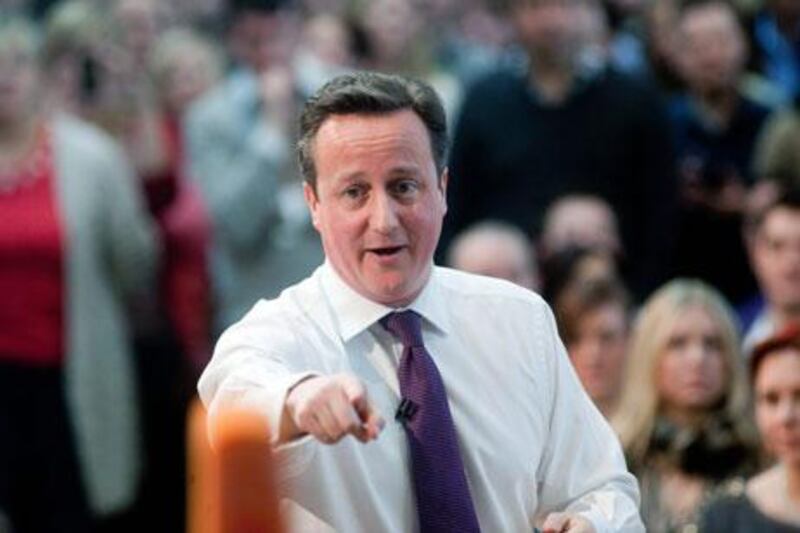NEW DELHI // Europe's wooing of India's defence and trade dollars continues on Monday with the arrival of the British prime minister, David Cameron in Mumbai, his second official trip to India.
The British delegation will be almost twice as large as the one that accompanied him in mid-2010, which Downing Street had pegged as the largest trade mission "in living memory".
The three-day trip aims to push the two countries closer towards Mr Cameron's objective: increasing bilateral trade to US$34 billion (Dh91.8bn) by 2015, up from roughly $25bn today.
Mr Cameron's visit begins just two days after the departure of the French president, Francois Hollande, who came to India to push sales of nuclear reactors and 126 Rafale fighter aircraft.
Mr Cameron arrives with hopes of luring India away from the $12bn Rafale deal. His government is instead promoting the Eurofighter Typhoon, which is manufactured by a British, German and Italian consortium.
"Hollande was in India this week, and a deal has not been signed, so we will want to find out from the Indians how their talks are progressing with the French," a British government source told the Press Association news agency.
A joint statement from Mr Hollande and the Indian prime minister, Manmohan Singh, released on Thursday, said of the Rafale deal that both countries "noted the ongoing progress of negotiations".
In India, however, "no defence deal is finalised even when it is finalised", Sushant K Singh, a national security fellow at the Chennai-based Takshashila Institution, an independent think tank, told The National. "In the kind of defence procurement scenario that India has, even after deals are signed, the defence minister may revoke them," he said.
Mr Singh pointed out that Mr Cameron's Eurofighter pitch, "taking into account the fact that the Indian defence budget and the Indian economy are under pressure", will be premised on offering a lower price.
But if Mr Cameron wishes to urge Indian defence authorities to change their mind about the sale, he comes at an inopportune time.
During the past week, India's defence establishment has been roiled by revelations that Finmecannica SpA, an Italian company, paid bribes to middlemen so that a tender for 12 helicopters was reworked in its favour.
That deal, worth $750 million, has now been suspended by the Indian government.
Also on Mr Cameron's agenda is the sale of 145 howitzers, priced at around $500m; renewed efforts to convince India to open up its retail sector to chains such as Tesco; and allaying Indian students' fears about applying to British universities.
Britain announced measures last week to restrict the influx of foreigners and their access to welfare benefits, housing and health care. But Mr Cameron clarified, to a British television station, that the rules were not intended to keep Indian students out.
"I think we haven't perhaps communicated this properly," he said. "The fact is today, as we stand, and this is going to be the case going forward, there is no limit on the number of students who can come from India to study at British universities, no limit at all."
As of last February, Indian graduates from British universities are allowed to stay on in the country if they make £20,000 (Dh116,000) a year. If, after five years, they are earning an annual salary of £35,000, they are eligible to apply for residency.
Roughly 39,000 students arrived in the United Kingdom to study in 2010-11, but that number dropped by 24 per cent in 2011-12, as British migration policies tightened.
The drop in numbers is misleading, said Ajay Mittal, director of the New Delhi-based International Placewell Consultants, which helps Indian students apply to universities overseas.
"What has happened is, many dodgy educational institutions in the UK have been shut down, so those numbers have decreased," Mr Mittal said. "But for quality institutions, the numbers have gone up. My applications have nearly doubled in this current year."
Nevertheless, he added, Mr Cameron's statements were welcome news.
"He's saying that the doors are still open and that there are still jobs to be had," Mr Mittal said. "That kind of reassurance from the top is always needed."
ssubramanian@thenational.ae
twitter: For breaking news from the Gulf, the Middle East and around the globe follow The National World. Follow us





